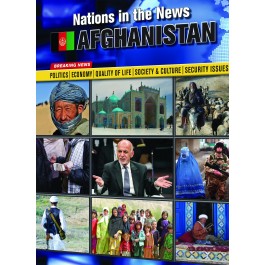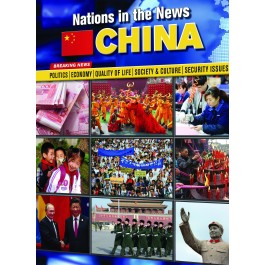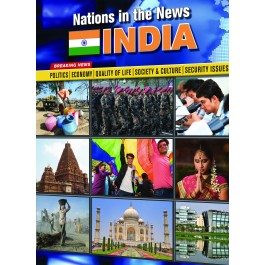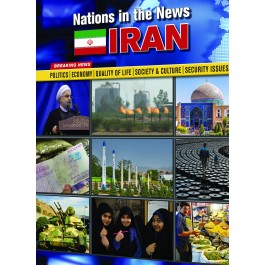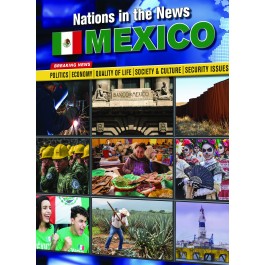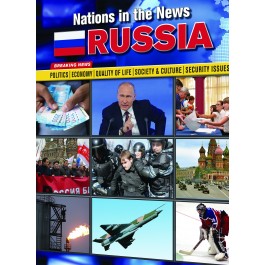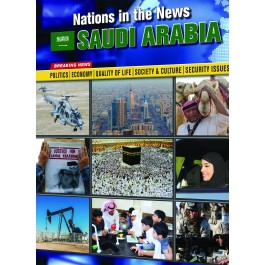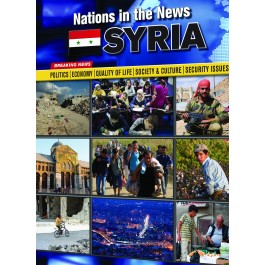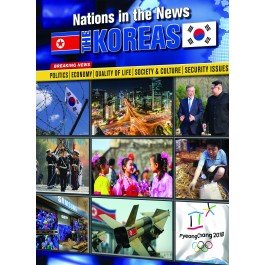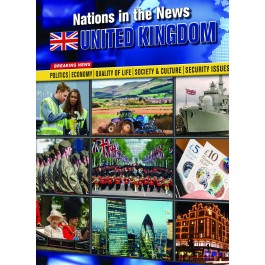NATIONS IN THE NEWS
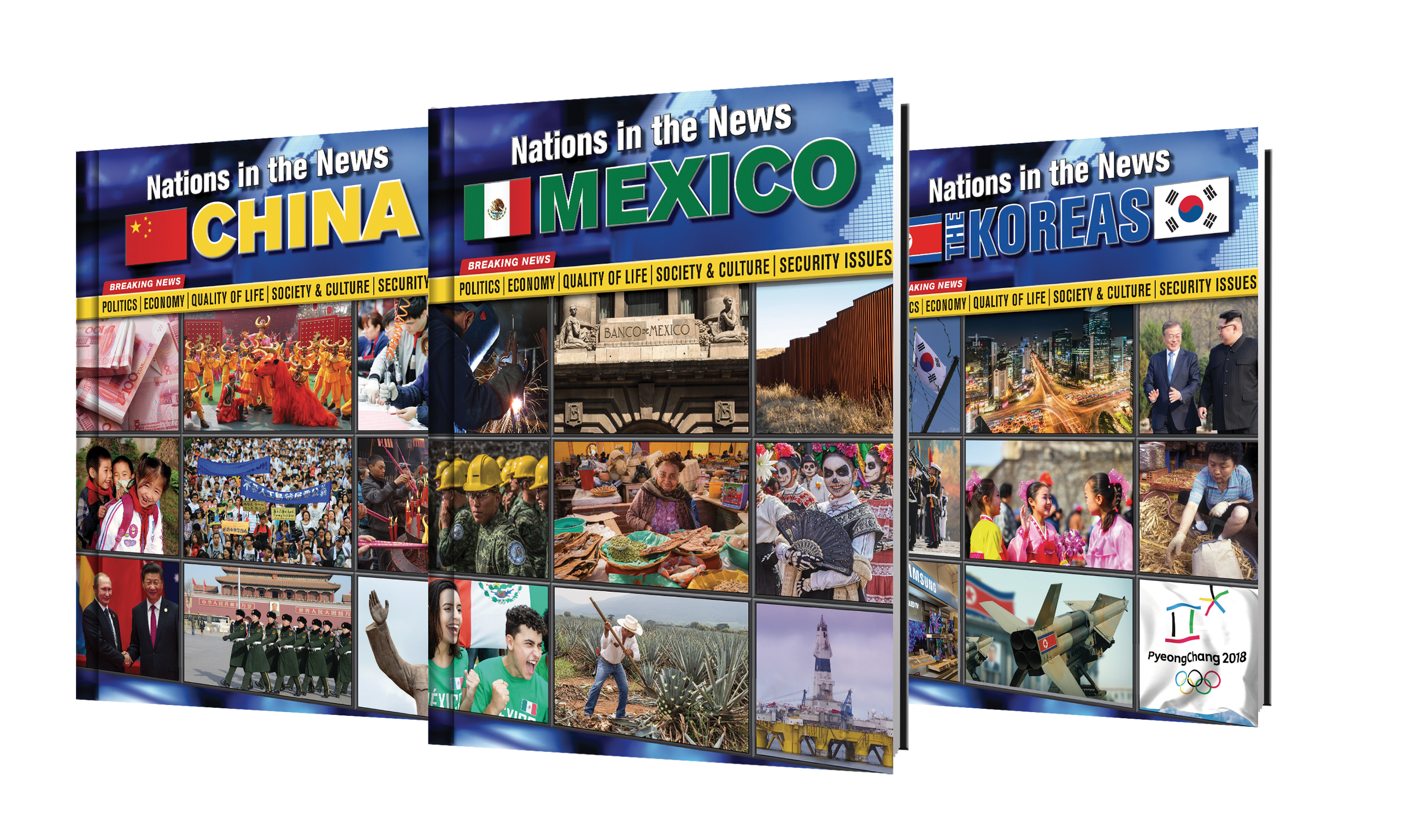
10
2020
12+
7th - 12th
6.5 x 9
by Jennifer L. Rowan
| Hardcover | ISBN 978-1-4222-4243-8 | $26.95 | Add To Cart |
| eBook | ISBN 978-1-4222-7571-9 | $33.95 | Add To Cart |
As a landlocked country in central Asia, the region now known as Afghanistan has stood at the crossroads of empires from ancient to early modern times. Today, the country remains at the forefront of international attention as numerous terrorist organizations operate within its borders, and the ongoing war between the United States, its allies, and rebel forces is nearly two decades old. Rife with economic strife and poverty, plagued by terrorist activity and insurgency, and led by a government struggling to maintain national security, Afghanistan’s future appears as difficult as its past. This volume will provide insight into the nation’s struggles as the second decade of the 21st century draws to a
close.
by David Wilson
| Hardcover | ISBN 978-1-4222-4244-5 | $26.95 | Add To Cart |
| eBook | ISBN 978-1-4222-7572-6 | $33.95 | Add To Cart |
China has become a global leader in the 21st century, relying on its military, economy, and diplomacy to project influence and become a superpower. With a billion and a half people, China’s population is the largest in the world today and one of the most advanced, enjoying the fruits of a technology industry that has grown to become second to none. But progress has not been universal, as many ethnic groups throughout China suffer repression, and the Communist Party maintains its iron grip on authority and information. At a time when the economy is booming and prosperity is growing, China has nevertheless come under scrutiny for its appalling human rights record and its persistent bullying of neighbors. The question of whether China will surpass the United States to become the world’s greatest power appears open, as does the question of whether the Communist Party will maintain its grip on power. For most Chinese, however, global dominance and politics are secondary to the stresses
of modern life. A wildly imbalanced sex ratio leads to a deficit of women; the One-Child Policy drastically changes traditional family dynamics; and poverty remains endemic throughout a rural population that more closely resembles the developing world than it does the modern. This book will help you explore the fascinating paradoxes, accomplishments, and problematic aspects of contemporary China.
by David Wilson
| Hardcover | ISBN 978-1-4222-4245-2 | $26.95 | Add To Cart |
| eBook | ISBN 978-1-4222-7573-3 | $33.95 | Add To Cart |
India is a nation both ancient and modern. Founded in 1947, its history dates back 4,000 years. The majority of India’s workforce is comprised of farmers; yet its overall economic growth stands among the world’s greatest. While its traditionalist society disenfranchises parts of the population, it has successfully carried out the largest free elections in the world. Seven hundred active languages and over one billion people characterize the Republic of India, a growing global power. By every measure, India has changed so much since its founding, boasting far better wealth and health, that it may as well be another country. For many Indians, however, little has changed: poverty remains endemic throughout much of society as the gains of a roaring economy go into the pockets of the wealthy. Hundreds of millions of Indians have no access to electricity, running water, or toilets, and earn as little as the equivalent of two dollars a day. The sheer size of India means that every problem
is a big problem, requiring a big solution.
by Norm Geddis
| Hardcover | ISBN 978-1-4222-4246-9 | $26.95 | Add To Cart |
| eBook | ISBN 978-1-4222-7574-0 | $33.95 | Add To Cart |
Today, Iran represents a threat to its neighbors and maybe even the world. It could be one of the next nations to develop nuclear weapons. Although the United States and Europe have been engaging in intense diplomatic efforts to convince Iran not to go further down that road, tensions remain high. Iran is a proud country with an exalted history. Many of its leaders see it as their destiny to be a dominant power in the region, and possibly a next world superpower. In contrast to the government’s aspirations, however, the people of Iran suffer high unemployment, social strife, and a harsh justice system that easily circumvents human rights. This has led to clashes between the government and citizens who simply desire jobs and a better life. Find out how Iran’s history and culture mesh to create a country of opportunity and
conflict.
by Jennifer L. Rowan
| Hardcover | ISBN 978-1-4222-4248-3 | $26.95 | Add To Cart |
| eBook | ISBN 978-1-4222-7576-4 | $33.95 | Add To Cart |
For much of the 20th and early 21st centuries, Mexico experienced a number of political, economic, and social upheavals that propelled the nation into the world’s news cycle. Internal conflicts have included a growing problem with violent crime and drug cartels, as well as high levels of poverty and obstacles to upward mobility for the Mexican population. International affairs, especially relations with the United States over the security of the border between the two nations and the fate of NAFTA, have garnered much attention in the past several years. This book seeks to explain the political, economic, and social climate of Mexico, and examines the current issues facing the third-largest country in North
America.
by Jennifer L. Rowan
| Hardcover | ISBN 978-1-4222-4249-0 | $26.95 | Add To Cart |
| eBook | ISBN 978-1-4222-7577-1 | $33.95 | Add To Cart |
As the world’s largest nation, the Russian Federation has become a key player in world affairs since the turn of the 21st century. Events within Russia and surrounding former Soviet republics have raised questions about whether Russia’s government has successfully transitioned away from the totalitarianism of the Soviet Union to a federal democracy. At the same time, international relations between Russia and the West contain echoes of Cold War distrust, as Russia seeks to solidify its foothold as a strong world power. From internal strife over the rights of citizens to concerns about international terrorism’s effect on Russia’s security, the breakdown of diplomacy with the European Union and the United States to renewed efforts to negotiate on economic and political issues in the wake of election meddling accusations, Russia’s place in the world’s news cycle continues to hold the world’s attention on a daily
basis.
by Norm Geddis
| Hardcover | ISBN 978-1-4222-4250-6 | $26.95 | Add To Cart |
| eBook | ISBN 978-1-4222-7578-8 | $33.95 | Add To Cart |
Saudi Arabia is a country in the midst of a major cultural shift. Women are beginning to see changes that allow them more freedom; yet the country still restricts them in ways unimaginable in Western society. The government’s ambitious Saudi Vision 2030 plan aims to modernize the infrastructure, technology, and tourism sectors to make Saudi Arabia more attractive to the international community. But the country’s harsh social policies risk alienating visitors and investors alike. As world economies pivot from fossil fuels to “greener” alternatives, Saudi Arabia risks losing its main source of income—oil—and the wealth of social services it provides for its growing population. To remain an influential player in Middle Eastern politics and a dominant force in world economics, Saudi Arabia will have to navigate through a dizzying social and economic
transformation.
by David Wilson
| Hardcover | ISBN 978-1-4222-4251-3 | $26.95 | Add To Cart |
| eBook | ISBN 978-1-4222-7579-5 | $33.95 | Add To Cart |
The war in Syria has attracted the attention of the entire world, sucking many nations into the fighting and creating millions of refugees who have fled their country in search of a better life. Many different rebel groups, some united and some unaligned, have fought to overthrow the government of dictator Bashar Al-Assad. The war has created numerous horrors, including the rise of the ultra-fundamentalist group ISIS, and has devastated the Syrian nation, people, and economy. As millions of refugees flee the violence, many nations are forced to decide what support they will give to these people—some opening borders and doors, others firmly shutting out refugees in the belief that they must preserve their own people, culture, and economy. What are the roots of this conflict and how did it come to involve so many regional and global powers? The war in Syria has produced a tangled web of alliances and enemies, supporters and detractors, which have turned a simple struggle against
tyranny into a war of opposing ideologies. There will be more fighting before peace comes to Syria. Meanwhile the Syrian people must decide for themselves whether they will stay under the rule of Assad or flee the country as millions of their countrymen have, looking for a new future outside the borders of this war-torn region.
by David Wilson
| Hardcover | ISBN 978-1-4222-4247-6 | $26.95 | Add To Cart |
| eBook | ISBN 978-1-4222-7575-7 | $33.95 | Add To Cart |
Though they share a border, a culture, a language, and thousands of years of history, it is hard to imagine two nations more different than North and South Korea. South Korea is a vibrant player in the global economy renowned for its technological and industrial prowess, while North Korea is a police state in which any political opposition to dictator Kim Jong-Un is met with exceptionally brutal punishment. How did the Korean Peninsula, an area smaller than the state of Colorado, come to play such a big role in the world today? The answer lies in the inconclusive Korean War of 1950 to 1953, which divided the Korean Peninsula at the 38th Parallel, and divided Korea into two states: communist and capitalist. The war and its aftermath have sucked in the world’s great powers: China supports North Korea while the United States is allied with South Korea. As North Korea works to develop a nuclear weapons program, the question of whether these super powers will come to blows over an
unresolved Cold War conflict becomes more demanding each day.
by Jennifer L. Rowan
| Hardcover | ISBN 978-1-4222-4252-0 | $26.95 | Add To Cart |
| eBook | ISBN 978-1-4222-7580-1 | $33.95 | Add To Cart |
The United Kingdom’s status as a world power dates back hundreds of years. With an empire that once spanned the globe, British influence over global economics and diplomacy shaped the histories of North America, Africa, Asia, and Australia. Today, the United Kingdom remains a key world power, exerting influence over international affairs. In recent years, governmental decisions about economic policy and diplomatic and military intervention around the world have prompted conflict among citizens and residents. The future of the United Kingdom’s participation in the European Union came under debate as the 2010s progressed, and the ensuing Brexit referendum and negotiations have thrown the fate of the United Kingdom’s constituency countries into doubt. This book will help you understand the rich history of the United Kingdom and how that history has shaped its current government, policy, and place in world
affairs.











